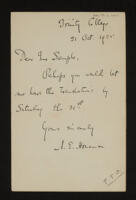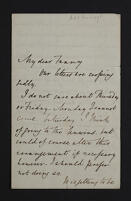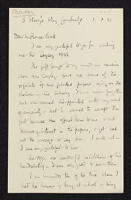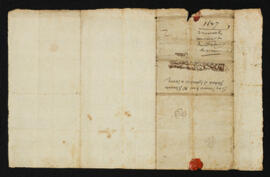183 Fleet Street. Requests a copy of toasts to be used to be used in the evening. With an endorsement made in 1823 concerning the imprisonment of Carlile.
Transcript
R.M.S: Anselm
Tuesday, March 11 | 1919
My very dear Mother
We are now approaching Lisbon and expect to arrive soon after daylight tomorrow morning. The weather has been pretty good; it was warmest on Sunday, which was a beautiful sunny day, and one could sit out on deck chairs without an overcoat. Yesterday and today, there was more wind and occasional showers. It has not been very rough, but there was sufficient motion to make a good many of the passengers unhappy. Of our party, Crommelin & Cottingham succumbed for a time, but they both seem much better today.
We all arrived at Euston an hour-and a half before the train started; but it took a good while to deal with our bulky luggage. We were charged 30/– excess, but most of that was for the object-glasses which being labelled “glass” were charged at a higher rate. We got to Liverpool at 3∙45 and then difficulties began. The Hotels were full and there were scarcely any porters at the station. At last we found a porter of a baggage agency, and put all except our handbags in his charge to deliver to the Steamer. Then we set off in a taxi to hunt for a Hotel. After 3 or 4 attempts we got in at quite a comfortable commercial hotel. I think we were probably very lucky. It was a pouring wet night, so we did not go out.
The next day we got down to the dock about 10 a.m. Our luggage was promised for 10∙30 a.m.; but did not arrive. Soon after 11 we had to go on board, because the emigration officer was only there for a short time. He just looked at the passports and did not worry about anything else. We were not very anxious about the luggage because we soon found about a dozen other passengers were in the same plight as ourselves having entrusted their luggage to the same firm. Ultimately about 12∙30 it all turned up, and we went down to lunch, much relieved.
The Anselm is a very nice boat, and seems much roomier than I expected. I should think there are at least sixty first-class passengers on board. Our cabin is nicely placed, a good height above the water, and is very quiet. Davidson & Crommelin are next door. It seems curious to have done with rationing entirely—unlimited sugar, and large slices of meat, puddings with pre-war quantity of raisins & currants in them, new white rolls, and so on.
We left at about 2 p.m. and went slowly through a chain of docks to the Mersey. One of the Directors of the Booth Line was on board at the start and saw us for a few minutes. We saw the lights of Holyhead about 9 p.m. and stopped a few minutes to drop the pilot. Since then we have seen no land whatever, and have had only very vague ideas as to our position; there is still a war-regulation which forbids them letting us know where we are & what our course is.
Davidson & Crommelin had to sit at the Captain’s table, so our party was broken up. It is supposed to be a special favour to be asked to sit there; but as they are too far from the Captain to get to know him, it does not seem much good. There is one other passenger whom I knew through correspondence, Mr. Walkey an amateur astronomer. He is going out for the Bible Society to live on a house-boat on the Amazon travelling up and down the various tributaries. He expects to be out there most of his life.
I have had a few games of chess with Crommelin and also with a Frenchman, have read a bit, and passed the time very comfortably. I am quite glad to be having a long steamer trip again.
With very dear love from
your affectionate son
Stanley
—————
Numbered ‘1st’ at the head. Two passages have been marked off in pencil by a later hand.
Transcript
Victoria Park, Manchester
Novr 9. 1909
Dear Mr Eddington,
May I ask you—in confidence—whether you consider yourself definitely fixed to “Astronomy” or whether you would at all consider a return to Physics as possible.—I am not at liberty to go into details but the question arises whether in case a chair of Theoretical Physics were founded here or elsewhere and suitable conditions were offered you would be prepared to accept the chair.—Also in that case it might help matters if you wd let me know what conditions you would consider acceptable.
You may take it for granted that the duties wd leave you plenty of time for private work and that nothing wd prevent you continuing to prosecute the line of research on which you have entered with such success
I remain
Yours sincerely
Arthur Schuster.
(With an envelope.)
—————
Transcript
Trinity College.
21 Oct. 1925
Dear Mr Semple,
Perhaps you would let me have the translations by Saturday the 31st.
Yours sincerely
A. E. Housman.
I. 5. 10: Transalpino—uisum
[I.] 11. 8: perge—desistant
[I. 11.] 10: par—geminatis
[I. 11.] 13: obiecta—cassauerimus
[I. 11.] 15: contionatoris mei
II. 2. 1: iam uer … porrigitur
[II. 2.] 2: concaua—compressus
[II. 2.] 3: nisi—uerere
[III. 3.] 7: tamquam—truncatum
[III.] 14. 2: non amplius—rideat
IV. 11. 3: hinc etiam—laudabilis
[IV.] 21. 2: ecce habes—existimabis
[IV.] 22. 3: itaque—opportunitas
V. 8. 2: nisi quod—appenso
[V.] 10. 4: quapropter—adhiberi
[V.] 13. 1: iam Clausetiam—insorduit
[V.] 15. 2: restat—mercedem
[V.] 19. 1: nutricis—impunitatem
[V.] 20. 4: praeterea—uenitur
[V. 20. 4]: namque erit—uideris
VI. 12. 6: illum dubia—complesti
VII. 1. 4: miraculo—naturam
[VII.] 12. 4: haec omnia—adiungi
[VII.] 14. 11: nostram quoque—exhorruit
*[VII.] 15. 1: sed et ille—possessio {1}
VIII[.] 6. 2: insuper—supergressus
[VIII. 6.] 8: quid multa—audiui
[VIII. 6.] 16: dein, quod—fortuitis
[VIII.] 8. 2: redde te patri—affectus
[VIII.] 9. 3: ago laboriosum—impetro
[VIII. 9.] 5: lines 48–51
[VIII.] 11. 9.
[VIII.] 12. 7: quid multa—epulones
[VIII.] 16. 3: si refutamur―simpliciter {2}
IX. 2. 1: iubetis―incipitur
[IX.] 9. 13: huic copulatum―philosophari
[IX. 9.] 14: curua ceruice―cute distenta
[IX.] 13. 1: crederem―fallere
[IX] 16. 3: de reliquo―munerabor
[IX. 16. 3]: lines 33–36.
[On the back of the letter are some pencil notes, presumably by Semple.]
[Direction on envelope:] W. H. Semple Esq. | St John’s College
—————
The references in the postscript are to the letters of Sidonius Apollinaris, which are referred to by book, letter, and section. Elements of references repeated from the previous line are omitted in the MS, but they have been supplied above in square brackets. The colons in these references have also been supplied.
{1} The significance of the asterisk is unclear.
{2} Altered to ‘simplicitas’ in pencil.
Cassiobury. Discusses the bye-election at Leominster
Reports the death of Francis Horner, proposes a monument, danger to Lord Holland in becoming Rector of St Paul's Covent Garden, no distress among the Poor
The title cited is from the title-page. The volume is labelled on the spine ‘St. Simon | Nouvelle Encyclopédie | MSS.‘, and on the front ‘L.D.L.S.’ The written leaves are numbered in the bottom right-hand corner from ‘d.73’ to ‘d.224’.
Ministry of Education.—Asks how he thinks the forthcoming Finance Bill debate should be handled.
Thanks for Richard Monckton Milnes' poetry, charmingly dedicated to his sister; asks how they should acknowledge it. Wished to have walked to Thornes to visit 'yourself, & dear Mrs M. Gaskell' who is a great favourite; kind remembrances from her sister also.
3 Storey's Way, Cambridge. - Thanks Rouse Ball for sending him the Cayley MSS, which he is very glad to have. Was at school with Cayley's son Henry; remembers doing Latin prose with him, and the 'various mathematical adventures' they had together; regrets not hearing of his later life.
On headed notepaper for 86 Chesterton Road, Cambridge. Has been a supervisor to Ambrose for more than two years, while she has been researching for her Ph.D. on 'Finitism in Mathematics'. She is 'an industrious & intelligent student, very well aware of the difficulties of the subject...& very persevering in her efforts to overcome them. She is keenly interested not only in the particular subject of her research but in philosophical problems generally'. Thinks 'she would be a competent & stimulating teacher of philosophy'.
Sem título![Letter from Victor de Riqueti to [Antoine de Sartine, Lieutenant de Police]](/uploads/r/trinity-college-library/d/6/d/d6dbf25a10cda29b36c8d5f3c67c22124e5631bc873b360235adb7d9e8147c0c/002.SRMS.B4.1.front.tmb.jpg)










![Letter from Richard Carlile to [Thomas Clio] Rickman](/uploads/r/trinity-college-library/1/f/8/1f81913a3980b50d55a84ee80090e57df65516987d5e77891efeb7e852b59fe8/002.SRMS.B23.1.front.tmb.jpg)


![Letter from Spencer Perceval to [ ] Love](/uploads/r/trinity-college-library/5/0/0/50009dc332af014961ab1ebb1c36f4333bc3ccaff9a2649a3be9ca5bd456d6ae/002.SRMS.B13.1.front.tmb.jpg)

![Letter from Sir James Mackintosh to [Thomas Malthus]](/uploads/r/trinity-college-library/9/a/b/9ab07b18f30e003ab9a06a529655259b8bfc0b4788d3b48923e6237805dbe996/002.SRMS.B20.1.front.tmb.jpg)







![Letter from Mary Ingram to Mrs [Mary?] Milnes Gaskell](/uploads/r/trinity-college-library/0/9/0/090223f06dcd69ed8cc82295e5662e2763ab7ec83199400dbc0ad256a534bb9e/HOUG.D.A.2.1_thumb.jpg)


